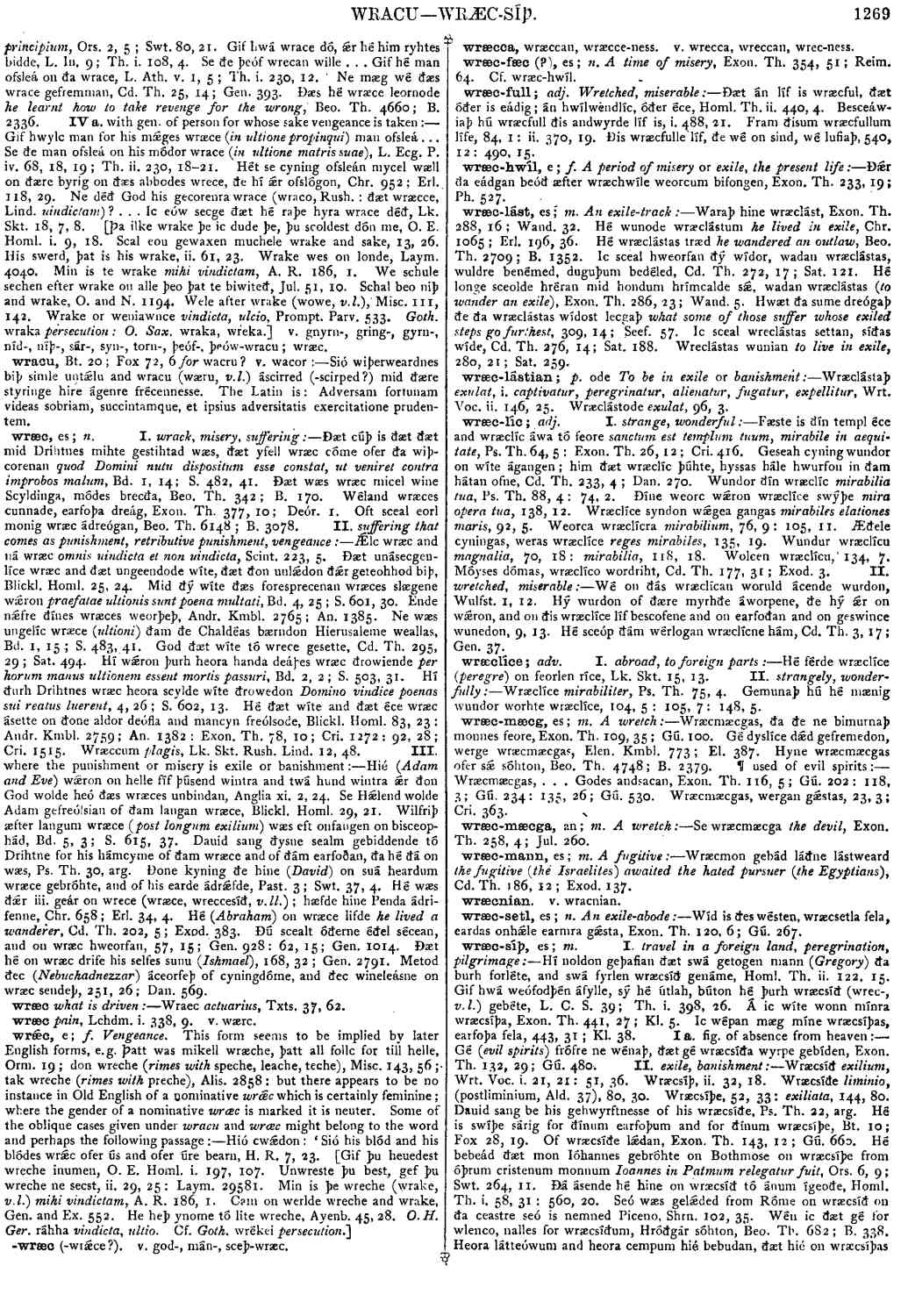wræc
- noun [ neuter ]
-
Ðæt cúþ is ðæt ðæt mid Drihtnes mihte gestihtad wæs, ðæt yfell wræc cóme ofer ða wiþcorenan
quod Domini nutu dispositum esse constat, ut veniret contra improbos malum,
- Bd. I. 14 ;
- S. 482, 41.
-
Ðæt wæs wræc micel wine Scyldinga, módes brecða,
- Beo. Th. 342 ;
- B. 170.
-
Wéland wræces cunnade, earfoþa dreág,
- Exon. Th. 377, 10 ;
- Deór. 1.
-
Oft sceal eorl monig wræc ádreógan,
- Beo. Th. 6148 ;
- B. 3078.
-
Ǽlc wræc and ná wræc
omnis uindicta et non uindicta,
- Scint. 223, 5.
-
Ðæt unásecgenlíce wræc and ðæt ungeendode wíte, ðæt ðon unlǽdon ðǽr geteohhod biþ,
- Blickl. Homl. 25, 24.
-
Mid ðý wíte ðæs foresprecenan wræces slægene wǽron
praefatae ultionis sunt poena multati,
- Bd. 4, 25 ;
- S. 601, 30.
-
Ende nǽfre ðínes wræces weorþeþ,
- Andr. Kmbl. 2765 ;
- An. 1385.
-
Ne wæs ungelíc wræce (ultioni) ðam ðe Chaldéas bærndon Hierusaleme weallas,
- Bd. 1, 15 ;
- S. 483, 41.
-
God ðæt wíte tó wrece gesette,
- Cd. Th. 295, 29 ;
- Sat. 494.
-
Hí wǽron þurh heora handa deáþes wræc ðrowiende
per horum manus ultionem essent mortis passuri.
- Bd. 2, 2 ;
- S. 503, 31.
-
Hí ðurh Drihtnes wræc heora scylde wíte ðrowedon
Domino vindice poenas sui reatus luerent,
- 4, 26 ; S. 602, 13.
-
Hé ðæt wíte and ðæt éce wræc ásette on ðone aldor deófla and mancyn freólsode,
- Blickl. Homl. 83, 23 :
- Andr. Kmbl. 2759 ;
- An. 1382 :
- Exon. Th. 78, 10 ;
- Cri. 1272 :
- 92, 28 ;
- Cri. 1515.
-
Wræccum
plagis.
- Lk. Skt. Rush. Lind. 12, 48.
-
Hie (Adam and Eve) wǽron on helle fíf þúsend wintra and twá hund wintra ǽr ðon God wolde heó ðæs wræces unbindan,
- Anglia xi. 2, 24.
-
Se Hǽlend wolde Adam gefreólsian of ðam langan wræce,
- Blickl. Homl. 29, 21.
-
Wilfriþ æfter langum wræce (post longum exilium) wæs eft onfangen on bisceophád.
- Bd. 5, 3 ;
- S. 615, 37.
-
Dauid sang ðysne sealm gebiddende tó Drihtne for his hámcyme of ðam wræce and of ðám earfoðan, ða hé ðá on wæs,
- Ps. Th. 30, arg.
-
Ðone kyning ðe hine (David) on suá heardum wræce gebróhte, and of his earde ádrǽfde,
- Past. 3 ;
- Swt. 37, 4.
-
Hé wæs ðǽr iii. gear on wrece (wræce, wreccesíð, v. ll. ) ; hæfde hine Penda ádrifenne,
- Chr. 658; Erl. 34, 4.
-
Hé (Abraham) on wræce lifde
he lived a wanderer,
- Cd. Th. 202, 5 ;
- Exod. 383.
-
Ðú scealt óðerne éðel sécean, and on wræc hweorfan,
- 57, 15 ;
- Gen. 928 :
- 62, 15 ;
- Gen. 1014.
-
Ðæt hé on wræc drife his selfes sunu (Ishmael),
- 168, 32 ;
- Gen. 2791.
-
Metod ðec (Nebuchadnezzar) áceorfeþ of cyningdóme, and ðec wineleásne on wræc sendeþ,
- 251, 26 ;
- Dan. 569.
Bosworth, Joseph. “wræc.” In An Anglo-Saxon Dictionary Online, edited by Thomas Northcote Toller, Christ Sean, and Ondřej Tichy. Prague: Faculty of Arts, Charles University, 2014. https://bosworthtoller.com/36535.
Checked: 1